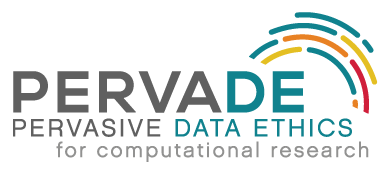Speaker: Camille Nebeker,
Director, UC San Diego Research Ethics Program
Co-Founder and Director, Research Center for Optimal Digital Ethics – Health (ReCODE.Health)
Associate Professor, Herbert Wertheim School of Public Health and Human Longevity Science
UCSD Design Lab
University of California, San Diego

Abstract
In this conversation, Dr. Camille Nebeker will share her experiences as Director of the Research Center for Optimal Digital Ethics (ReCODE) including her insights on building tools to help researchers navigate ethical issues of risk assessment, informed consent, and how to report back to the communities they study.
Camille Nebeker
Camille Nebeker, EdD, MS, is an Associate Professor with appointments in the UC San Diego Design Lab and the Wertheim School of Public Health. She is director of the UC San Diego Research Ethics Program and affiliated with the Institute of Practical Ethics. She co-founded and directs the ReCODE Health center, which provides education and consultation services to guide ethical practices in technology-supported health research. Dr. Nebeker applies a human centered design approach to shape ethical research practices (e.g., risk assessment, informed consent, return of results), which has led to development of decision support tools (see: Digital Health Checklist and Framework and Connected and Open Research Ethics platform). She serves as a member of the World Health Organization Digital Health Roster of Experts, American Association for the Advancement of Science Committee on Scientific Freedom and Responsibility, IEEE Organizational Governance of AI Working Group and the Society of Behavioral Medicine Digital Health Council. Dr. Nebeker’s research has received support from federal, foundation and industry sources including the NSF, NIH, Office of Research Integrity, RWJF and IBM. Publications related to her work are accessible via: https://escholarship.org/uc/recodehealth_publications.
Speaker: Anna Lauren Hoffmann
Assistant Professor
The Information School
University of Washington

Abstract
As we recognize the ways data-driven technologies and processes can inflict harm, we look towards ethics to help foster better futures. In this “Conversation with PERVADE” we’ll talk with Dr. Hoffman about the normative ideals that shape how we think about harms driven by information technologies—and their solutions.
Anna Lauren Hoffmann
Dr. Hoffmann is an assistant professor with The Information School at the University of Washington. She is a senior fellow with the Center for Applied Transgender Studies and a founding member of AfterLab, a research group dedicated to the critical and cultural study of information, data, and archives in crisis and transition. Her work has appeared in New Media & Society, The Review of Communication, Library Quarterly, and Convergence: The International Journal of Research Into New Media Technologies.
Speaker: Amandalynne Paullada
Postdoctoral Fellow
Biomedical Informatics and Medical Education
University of Washington School of Medicine

Abstract
This talk will focus on the importance of datasets and benchmarks to responsible machine learning (ML), the current state of dataset curation and reuse in ML, best practices for data use by ML researchers and developers, and understanding the social impact of digital data practices.
Amandalynne Paullada
Amandalynne Paullada is a NLM postdoctoral fellow in the department of Biomedical Informatics and Medical Education at the University of Washington School of Medicine. Her doctoral work, completed in the Department of Linguistics at the University of Washington, focused on the societal impacts of natural language processing technologies.
Speaker: Alex Hanna
Director of Research
Distributed AI Research Institute (DAIR)

Abstract
The increasing focus on big data, AI, and data-driven modeling to make decisions has raised a number of ethical concerns about the data itself and the people it affects. In this conversation, Dr. Alex Hanna will discuss work she is doing as Director of Research for the Distributed AI Research (DAIR) Institute and her thoughts on how to bring more social science and critical data science theories and methods into the computational work driving technological change.
Alex Hanna
Dr. Alex Hanna is Director of Research at the Distributed AI Research Institute (DAIR). A sociologist by training, her work centers on the data used in new computational technologies, and the ways in which these data exacerbate racial, gender, and class inequality. She also works in the area of social movements, focusing on the dynamics of anti-racist campus protest in the US and Canada.
Dr. Hanna has published widely in top-tier venues across the social sciences, including the journals Mobilization, American Behavioral Scientist, and Big Data & Society, and top-tier computer science conferences such as CSCW, FAccT, and NeurIPS. Dr. Hanna serves as a co-chair of Sociologists for Trans Justice, as a Senior Fellow at the Center for Applied Transgender Studies, and sits on the advisory board for the Human Rights Data Analysis Group and the Scholars Council for the UCLA Center for Critical Internet Inquiry. FastCompany included Dr. Hanna as part of their 2021 Queer 50, and she has been featured in the Cal Academy of Sciences New Science exhibit, which highlights queer and trans scientists of color. She holds a BS in Computer Science and Mathematics and a BA in Sociology from Purdue University, and an MS and a PhD in Sociology from the University of Wisconsin-Madison.
Speaker: Mark Dredze
John C. Malone Associate Professor
Department of Computer Science
Johns Hopkins University

Abstract
Join us for the next “In Conversation With PERVADE” where we will meet Dr. Mark Dredze (Johns Hopkins University) and learn about his experiences navigating the ethical dimensions of public health informatics and using social media data and machine learning techniques to improve public health outcomes.
Mark Dredze
Mark Dredze is the John C Malone Associate Professor of Computer Science at Johns Hopkins University. He is affiliated with the Malone Center for Engineering in Healthcare, the Center for Language and Speech Processing, among others. He holds a secondary appointment in the Biomedical Informatics & Data Science Section (BIDS), under the Department of Medicine (DOM), Division of General Internal Medicine (GIM) in the School of Medicine. He obtained his PhD from the University of Pennsylvania in 2009.
Prof. Dredze’s research develops statistical models of language with applications to social media analysis, public health and clinical informatics. Within Natural Language Processing he focuses on statistical methods for information extraction but has considered a wide range of NLP tasks, including syntax, semantics, sentiment and spoke language processing. His work in public health includes tobacco control, vaccination, infectious disease surveillance, mental health, drug use, and gun violence prevention. He also develops new methods for clinical NLP on medical records.
Speaker: Libby Hemphill
Associate Professor
School of Information
University of Michigan

Abstract
In this conversation, Dr. Libby Hemphill will talk about data stewardship for personal and pervasive data, providing responsible researcher access to social media and digital data, and the role of data repositories in building trust in pervasive data research.
Libby Hemphill
Libby Hemphill, PhD, is an associate professor at the University of Michigan School of Information and the Director of the Social Media Archive at ICPSR. She collects, studies, and archives social media data. When studying social media, she focuses on content moderation and online toxicity. When archiving social data, she works to create equitable, ethical, accessible data resources for social media researchers.
Speaker: Sacoby Wilson
Professor and Program Director
School of Public Health
University of Maryland – College Park

Abstract
In this talk Dr. Sacoby Wilson will discuss the work of the UMD Center for Community Engagement, Environmental Justice and Health; sustaining ethical data use relationships with communities; and what participatory data research looks like in action.
Sacoby Wilson
Dr. Sacoby Wilson is a Professor with the Maryland Institute for Applied Environmental Health and Department of Epidemiology and Biostatistics, School of Public Health, University of Maryland-College Park. Dr. Wilson has over 20 years of experience as an environmental health scientist in the areas of exposure science, environmental justice, environmental health disparities, community-based participatory research, water quality analysis, air pollution studies, built environment, industrial animal production, climate change, community resiliency, and sustainability. He works primarily in partnership with community-based organizations to study and address environmental justice and health issues and translate research to action. Dr. Wilson is Director of the Community Engagement, Environmental Justice and Health (CEEJH) initiative. CEEJH is focused on providing technical assistance to communities fighting against environmental injustice and environmental health disparities in the DMV region and across the nation.
Speaker: Stevie Chancellor
Assistant Professor
Computer Science & Engineering
University of Minnesota – Twin Cities

Abstract
What is Human Centered Machine Learning (HCML) and what does ethics look like in that space? How can we ethically conduct research in sensitive spaces or on sensitive topics, such as mental health? How can we empower people whose data is used for research? Learn about this and more in the first In Conversation With PERVADE event at University of Maryland College of Information Studies.
Stevie Chancellor
Dr. Stevie Chancellor is an Assistant Professor in the Department of Computer Science & Engineering at the University of Minnesota. Her research combines approaches from human-computer interaction and machine learning to build and critically evaluate human-centered systems. She studies dangerous mental health behaviors on social media, like suicidality, self-injury, and eating disorders, as well as the implications of doing machine learning research on these communities. Her work has been featured in The Atlantic, Wired, Smithsonian Magazine, and Gizmodo. Dr. Chancellor recently received her doctorate in Human-Centered Computing from Georgia Tech
